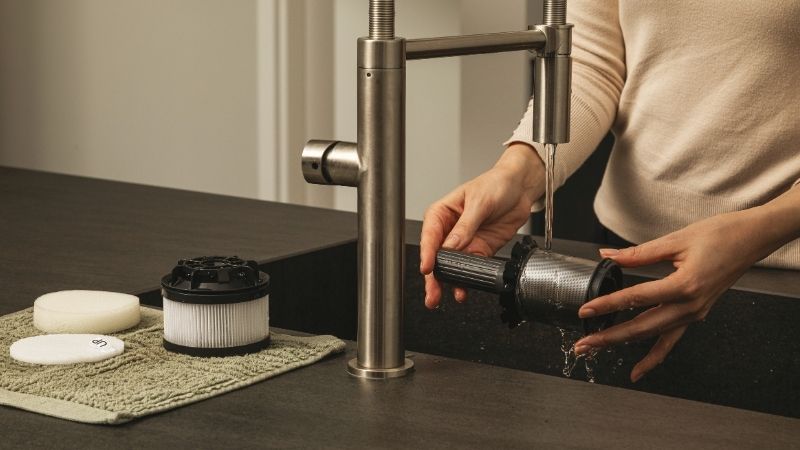How much water does a dishwasher consume? How can I reduce energy consumption? Using the dishwasher whilst protecting the Planet is entirely possible - just choose the right model and follow a few green tips
It is common knowledge that the dishwasher is one of the most beloved and appreciated appliances by English families, as it lets you save time, it is much more hygienic and effective than manual washing, and it helps you keep your dishes in order and clean. And what is its environmental impact? Knowing how much water and energy your dishwasher consumes and how to reduce waste is essential, for a more sustainable way of living.
Is manual washing better? Here is how much water the dishwasher consumes
Many people think that washing the dishes manually is much more sustainable with lower water consumption compared to a dishwasher. But is it really more sustainable?
In general, a dishwasher helps you save on the quantity of water used: if you’d wash the same amount of dishes by hand, you would waste more litres of water - especially if you have the nasty habit of letting the water run from the tap indefinitely.
Therefore, opting for the dishwasher is certainly the wiser choice for the environment! Actually, it all depends on the appliance, on its loading capacity, on the cycle duration, its technology and, lastly, on the energy class.
If, before you purchase a dishwasher, you want to know more about its actual efficiency by comparing it with the less efficient model on the market, you can use Youreko’s tool - our energy certifier that shows you how much you could save, based on the appliance use.
How can I cut down on the dishwasher’s water consumption? Sustainable tips
Now that you know that the dishwasher is your friend, when you are trying to live a greener lifestyle, here are a few tips about washing dishes and glasses in an even more sustainable way.
- Fill up the appliance: make sure you load the dishwasher to the fullest. This way, you’ll wash more dishes in a single cycle.
- Do not pre-rinse, just remove any build-up with a napkin and throw them into the organic waste.
- Choose the right washing cycle: quick, eco or standard, based on the quantity and type of dishes and how dirty they are. How long does a dishwasher cycle last? It depends. It can range from 29 minutes to 4 hours.
- Eliminate limescale: it is scientifically proven that limescale has a high insulating power, and when it builds up in the dishwasher, it reduces its efficiency and increases energy consumption. For instance, did you know that even 2mm of limescale build-up can cause up to 15% more energy consumption, and the waste increased by 7/10% every mm of limescale? In order to prevent it, use a sanitizing limescale remover, such as Care+Protect’s and further reduce your energy consumption.
Class B dishwasher: how much can you reduce the environmental impact?
When we talk about energy savings, in order to reduce waste and CO2 emissions, choosing a modern dishwasher and finding the most efficient model energy-wise is essential.
For instance, the H-DISH 700 PRO, Hoover’s Class B inset dishwasher is one of the best on the market for energy efficiency and performance. It offers the best washing experience, thanks to the innovative Maxi Tub, which allows you to increase the loading capacity by 10% compared to standard models, and, thanks to the New Eco-Power Inverter Motor, it reaches top energy efficiency levels.
Furthermore, thanks to the hOn app, you’ll always have the Energy Manager and all performance statistics on your smartphone, in order to use your dishwasher in the best way possible, saving time and energy.



